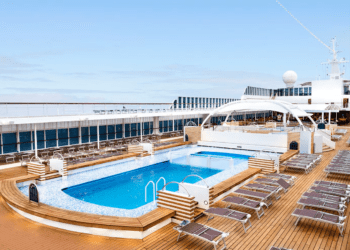Planning an overseas trip? Many countries require you to have a visa – a document that’s either physically attached to your passport, or in the case of an e-visa, linked electronically – that entitles you to enter the country you plan to visit. This is issued by the relevant embassy or consulate.
Ahead of applying for a visa, it’s crucial to ensure your finances are in order.
Overseas travel is extremely expensive for South Africans, due to the weak rand and high cost of living in popular foreign destinations. A two-week trip to France, for example, can cost R48,000 to R91,000, or more. Expenses include a round-trip flight (R12,000 to R20,000), accommodation (R1,500 to R3,000 daily), food and eating out (R500 to R1,000 daily), transport (R3,000 to R5,000), and sightseeing and activities (R5,000 to R10,000).
Because travel is a significant investment for a middle-income earner, it’s vital to ensure your travel plans are not scuppered at the last minute, says Sarah Nicholson, operations manager ofJustMoney.co.za, a platform that helps South Africans make good money choices.
“You don’t want to jeopardise the experience of a lifetime by having your visa rejected or delayed before departure, simply because you’ve supplied an outdated photograph or forgotten to have a document stamped,” she cautions.
Visa costs
Visa types include a tourist visa, which allows you to visit for a set amount of time without working; a transit visa to pass through a country en route to your destination; a work visa or remote work visa; and a student, offshore, or crew visa. There are also spousal, ancestral and retirement visas, and a host of other visa categories.
South Africans travelling to most European countries require a Schengen visa. This currently costs $80 – roughly R1,530 – per adult, subject to currency fluctuations. A United States tourist or business visa costs $185, or R3,500. A six-month British visitor visa costs £117 or R2,750.
“You may also need to cover travel to the visa application centre for a Schengen visa, or US consulate for an interview; courier fees for visa delivery; and service fees if you use a visa agency,” says Nicholson.
“In addition to the set fees, you may have to pay priority fees if you don’t have enough processing time before departure,” says visa specialist Dirk Bouwer, founder of Bridging the Gap.
Visa service/agency fees range between R500 and R2,000, depending on the service needed. Document courier fees can range between R200 and R1,500, depending on the courier service requested.
Steps to obtaining a visa
Although country processes differ, you’ll generally need to identify the correct visa for your trip, source a checklist of required documents, and take note of processing times and fees.
Next, complete the visa application form and assemble the necessary documents. Pay the visa fee – this will also enable you to secure an appointment, if needed – and, where required, book a slot at the relevant visa application centre. Attend your appointment, track the progress of your application online, and collect your passport from the centre, noting the decision.
Master the visa process
It’s crucial to identify reputable companies to assist with your visa arrangements, says Bouwer. “If one document in a sequence is omitted, your visa could be refused. If you trust a pop-up company you might lose the fees you paid,” he cautions.
JustMoney offers the following tips to help you navigate the visa application process. Be aware that requirements can change quickly, and exchange rates fluctuate.
- Ensure your passport is valid. Many countries require passports that are valid for at least three to six months beyond your planned departure date from your destination country. Your passport must have a minimum number of blank pages, usually at least two, for entry and exit stamps.
- Set a travel budget. Calculate the cost of flights, accommodation, meals, transport, travel insurance, and sightseeing. It’s wise to have an emergency fund, too.
- Fill in forms correctly. Ensure you fill in your full name, passport number, and date of birth exactly as they appear in your passport. If your name appears in reverse order in official documents, copy this format when filling in a form.
- Understand flight requirements. Some countries require confirmed flight bookings, while others accept tentative plans. Compile an itinerary showing round-trip reservations. Include dates and flight numbers for your entry and exit.
- Provide detailed travel plans: If friends or relatives are hosting you, provide a detailed invitation letter according to regulations. If you are on a prepaid tour, provide the itinerary and proof of payment to the tour operator.
- Select refundable or flexible bookings. This limits your financial risk if your visa application is rejected or your trip is delayed.
- Provide proof of employment. Obtain a work letter stating your continued employment and monthly salary. If you’re self-employed, provide the required business documents. If you’re behind on your tax returns, sort this out, especially if applying for a work visa.
- Organise your bank statements. Visa applications generally require at least three months’ worth of bank statements. Ensure your account is active and reflects regular income. Also, ensure your bank statements are attested – that is, signed and stamped by a bank official.
- Prove you have sufficient funds. You can use a combination of accounts, such as savings and investment portfolios, to meet this requirement. It’s advisable to obtain a letter from your financial adviser confirming this.
- Explain large cash deposits. Visa authorities might flag sudden, large cash deposits into your account. If you have received a gift or loan from family or friends, provide a letter or documentation explaining the deposit.
- Ensure photos meet requirements. Note rules about size, quality, background, appearance, expression, glasses, lighting, and framing. Budget R100-R250 for these.
- Obtain insurance. Check what’s covered by your medical aid and personal insurance policies. Free cover is available when you pay for your flight by credit card, but this is generally limited, and excesses can be high. Extra travel insurance could cost R350-R1,200, depending on coverage.
- Be on time for your appointment. If an appointment is part of the process, give yourself plenty of time to reach the visa application centre, embassy, or consulate.
Once you’ve collected your passport with visa, JustMoney advises taking care of the following items before you embark on your adventure.
- Notify your bank. Inform your bank of your travel dates and destinations and activate your debit and credit cards for international use.
- Check transaction fees. Banks often charge additional fees for international card usage, including foreign ATMs. Ask about partner banks with reduced or waived fees. Some banks offer prepaid travel cards with reduced fees. Load these with foreign currency and use them like a debit card.
- Carry back-up cards. Take at least two forms of payment, such as a debit and credit card, in case one gets lost or stolen, or doesn’t work overseas.
- Store emergency contacts. Note helpline numbers should your cards be lost or stolen, or if you need to access healthcare or make an insurance claim. Be sure to install any apps needed to access these services, before you depart for your trip.
- Keep copies of documents: Scan and store your passport and financial documents for easy access in case of follow-ups or emergencies.
Preparing your finances, gathering the necessary documents, and understanding the country’s specific visa requirements helps reduce the risk of delays or rejections, concludes Nicholson. This preparation not only helps avoid last-minute complications but also allows you to focus on the excitement of your trip, giving you peace of mind and the freedom to enjoy the experience.
Handy travel links:
- Documentation checklists for visa applications: www.vfsglobal.com.
- Bridging the Gap: https://bridgingthegap.co.za/ | Tel: 021 403 6423 |
info@bridgingthegap.co.za



































